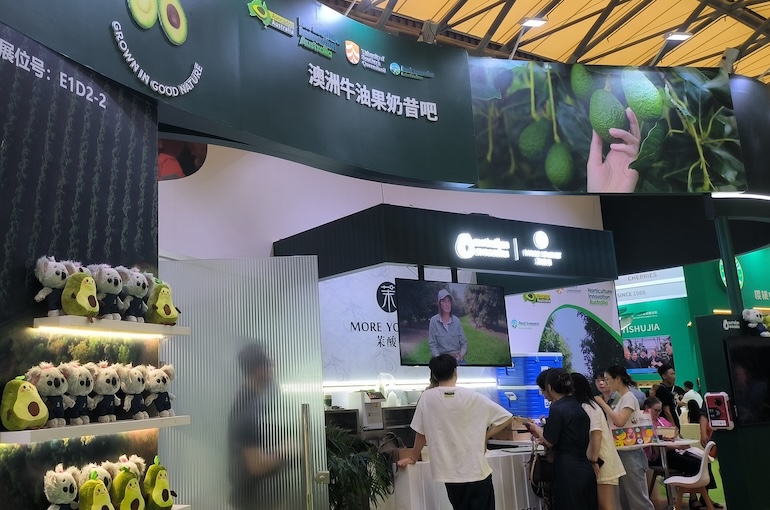 Avocados Australia Joins China’s Fruit Expo in Bid to Hasten Market Entry
Avocados Australia Joins China’s Fruit Expo in Bid to Hasten Market Entry(Yicai) Aug. 29 -- Avocados Australia, the representative body for the Australian avocado industry, has attended this year’s China International Fruit Expo to build relationships with potential local partners and industry associations and prepare to enter the Chinese market.
“Avocados Australia wishes to gain access to the Chinese market as soon as possible,” Chief Executive Officer John Tyas told Yicai at the CIFE yesterday. “While waiting for official negotiations, we are here to build relationships with importers and the China Chamber of Commerce for Import and Export of Foodstuffs, Native Produce, and Animal Byproducts, as well as get Chinese customers to know our products.”
The three-day CIFE kicked off yesterday at the Shanghai New International Expo Center, co-organized by the CFNA and the China Fruit Marketing Association. This year, more than 260 exhibitors from over 30 countries and regions attended the event, which covers an area of about 23,000 square meters.
Tyas explained that in order to enter the Chinese market, Avocados Australia needs to create a synergy with importers, such as SupaFresh, and the China Chamber of Commerce for Import and Export of Foodstuffs, Native Produce, and Animal Byproducts, better known as CFNA.
SupaFresh is China’s largest and first importer of avocados. Its President Jason Xu told Yicai yesterday that he was the one who organized the first-ever shipment of avocados from Mexico to China in 2012.
China’s avocado market has grown significantly since 2012, thanks to various factors. According to Lu Yu, vice president of the CFNA, young Chinese consumers’ increasing demand for healthy products and focus on nutritional values is the main reason for avocados’ popularity in China.
Moreover, Xu noted that the new generation of Chinese consumers now cares more about their bodies and health, so they search for low-calorie, high-protein, zero-sugar products.
Avocado production in China is very limited because the season only lasts four months, from October to January, Xu pointed out. As a result, the country heavily relies on imports to meet demand.
China imported 65,581 tons of avocados last year, up nearly 59 percent from the previous year, according to data provided by the CFNA. Peru was China’s largest avocado supplier last year, with the import volume up 76 percent to 50,001 tons, accounting for nearly 77 percent of the total. Chile and Kenya followed Peru with import volumes of 8,126 tons and 4,324 tons, down 11 percent and up 875 percent, respectively.
China’s avocado import value jumped nearly 35 percent to USD151.2 million in the period, CFNA data also showed.
However, Xu explained that the current situation is not ideal because each of China’s avocado suppliers has a limited production season, so imports need to constantly alternate from country to country, an issue that also affects product quality.
“We hope that in the future, SupaFresh can start importing avocados from Australia because they can supply all year long, and their products are of high quality,” Xu said.
Australia has many different climates, so avocado plantations in different regions have different harvest times, making it possible for Avocados Australia to supply customers with consistently high-quality products throughout the whole year, Tyas noted, adding that the organization has also built a comprehensive sustainable supply chain and set high food safety standards.
In addition, Avocados Australia has already established a strong presence in Southeast Asia and Hong Kong, making it easier for Australian avocados to reach the Chinese mainland market, Tyas pointed out.
Avocados Australia holds around 70 percent of the Hong Kong market, 85 percent of the Singaporean market, and 78 percent of the Malaysian market, according to data disclosed by Tyas.
Another advantage that Avocados Australia would have in China is that Chinese consumers recognize the quality of Australian products, Lu said. For example, Australian beef and dairy products are very popular in China as they are considered of very high quality, safe, and sustainable, she added.
The organization has invested heavily in research and development to improve every single aspect of its supply chain, from the farm to the warehouse, according to Tyas.
When asked whether the competition from local producers would impact Avocados Australia’s potential future business in the country, Tyas noted that he hopes for Chinese producers and Avocados Australia to compensate and sustain each other.
For example, Avocados Australia can help Chinese producers improve their quality and cultivating methods by sharing knowledge. The association has more than seven years of experience, while Chinese companies have been producing avocados for only three to four years, so they have a lot to learn.
Meanwhile, Chinese producers can help Avocados Australia reach retailers and consumers in the country.
Editor: Martin Kadiev